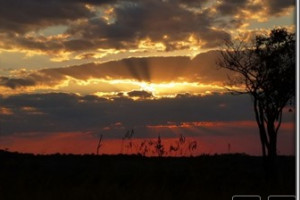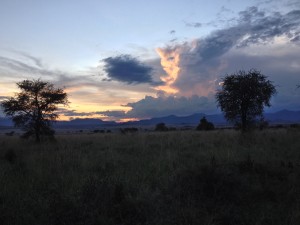A word from Curt
This week I’m Camp Missionary at Dry Creek Baptist Camp. The following story on Buddy Woods and Kenneth Trent reminds me of how important imparting a love of missions is.
Enjoy.

Uncle Buddy
I’ve always loved missionaries. Those who serve God away from home have always been my heroes. I first began this love of missions as a young R.A. boy. Throughout my years of camp at Dry Creek, the yearly act of being with real live missionaries has only deepened my respect for these folks.
This summer, as always, we were blessed with great missionaries. But one missionary who really stood out was Buddy Wood. “Uncle Buddy” as he was called by the campers, is a retired Southern Baptist missionary who served in Africa and Asia. He brought many of his African items of interest—zebra skin, machete, snake skins . . .
Bro. Buddy related to me how since being widowed several years ago, he had poured his life into sharing missions at camps like Dry Creek. It was evident from when he arrived that here was a man passionate about sharing the vision of foreign missions . . .
He set up this display in the corner of the new snack shack. Throughout the day he spent hours with the kids sharing about missions. His time in the Tabernacle with the campers was well-planned and received. As I sat and listened, I wondered how many future missionaries might be in this crowd. Or how many, like me as a pre-teener, would develop a lifelong love and respect for missions through a camp experience.
As I sat there, my mind drifted back to the R.A. Camps of my boyhood. For more than ten consecutive years there was only one camp missionary—Dr. Kenneth Trent. Dr. Trent, pastor of Second Baptist Church in Channelview, Texas, was the perfect missionary for boys.
Now Dr. Trent wasn’t a true missionary in the literal sense. His mission stories came from yearly short-term trips to Africa or South America. Kenneth Trent was a great storyteller and showman. He understood that young boys were impressionable and would be spellbound by stories that told of the native countries and the sharing of the gospel.
As Dr. Trent held up an African Tribal machete and told of the warriors coming to his messages holding menacingly onto their machetes and spears, I felt as if I were there. He would wave the machete wickedly as he shared a story relayed by one of the career missionaries of warriors coming to kill members at church only to be turned back by the power of prayer.
He would then hold up his Masaai blood gourd and tell in gross detail of how the tribal members would mix cow urine, milk, and blood for their daily lunch while in the bush with the cattle. When he’d describe the drink, I could nearly taste it in my mouth.
I heard these stories year after year, but always looked forward to them. And the stories were simply a vehicle to do what Dr. Trent really wanted to do—share the gospel of Jesus Christ.
On Wednesday night of camp, he would show slides of his mission travels. Invariably he would end the program with a beautiful jungle sunset. Dr. Trent would plead that for many in the world, “the sun is going down without them knowing Jesus Christ.” He would always issue an invitation to any boy who hadn’t accepted Jesus Christ. Turning to point at the red sunset he would remind all of us that this could be our last sunset to make life’s most important decision. Many a young man made life-changing decisions during those services. Ricky Gallien, one of my boyhood friends, was saved during such an invitation. Ricky now serves as pastor of Calvary Baptist Church near Merryville.

Even though the African “curios,” as Dr. Trent called his display items, were popular, nothing could match two South American items he had.
The first was a stuffed piranha fish. This fish, about the size of a man’s hand, sported needle-sharp teeth. Dr. Trent described in graphic detail what would happen to a cow or pig that wandered into a piranha-infested stream in the Amazon. Even swimming in Bundick Creek was scary after the piranha stories.
But the ultimate curio he had was saved until the last day of camp. Dr. Trent would pull a small glass box out of a paper bag. Inside the glass box was a genuine shrunken head from Ecuador. I’m not sure how he procured it, but it was real. You’ve never seen the attention of three hundred boys riveted on anything like the shrunken head.
It was about the size of a man’s fist. Dr. Trent would explain the native process of shrinking a head. Once again this conversation piece, and what a conversation piece it was among the boys, was only a tool to share the gospel. Dr. Trent would share how this man, killed by an enemy, had never heard the gospel. The need to share Jesus everywhere was once again burned into my heart.
I still encounter men of my age group who after finding out I work at Dry Creek say, “When I attended camp as a boy, there was this missionary with a shrunken head. Do you remember him?”
I smile and reply, “How could anyone forget Dr. Kenneth Trent?”
So as Uncle Buddy unwraps another item from Zimbabwe and ten-year-old boys ooh and aah, I know that a new lifelong love of missions is being born in hearts at Dry Creek.

 Creekbank Stories Curt Iles, Storyteller
Creekbank Stories Curt Iles, Storyteller
